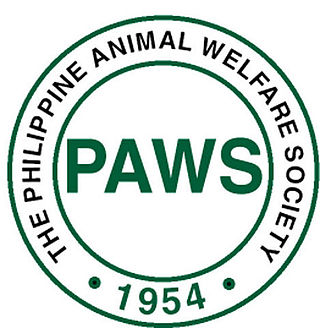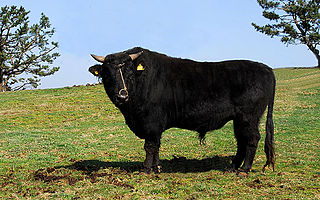The American Society for the Prevention of Cruelty to Animals (ASPCA) is a non-profit organization dedicated to preventing animal cruelty. Based in New York City since its inception in 1866, the organization's mission is "to provide effective means for the prevention of cruelty to animals throughout the United States."

Pet adoption is the process of transferring responsibility for a pet that was previously owned by another party. Common sources for adoptable pets are animal shelters, rescue groups, or other pet owners. Some organizations give adopters ownership of the pet, while others use a guardianship model wherein the organization retains some control over the animal's future use or care.

An animal shelter or pound is a place where stray, lost, abandoned or surrendered animals – mostly dogs and cats – are housed. The word "pound" has its origins in the animal pounds of agricultural communities, where stray livestock would be penned or impounded until they were claimed by their owners.

Trap–neuter–return (TNR), also known as trap–neuter–release, is a controversial method that attempts to manage populations of feral cats. The process involves live-trapping the cats, having them neutered, ear-tipped for identification, and, if possible, vaccinated, then releasing them back into the outdoors. If the location is deemed unsafe or otherwise inappropriate, the cats may be relocated to other appropriate areas. Ideally, friendly adults and kittens young enough to be easily socialized are retained and placed for adoption. Feral cats cannot be socialized, shun most human interaction and do not fare well in confinement, so they are not retained. Cats suffering from severe medical problems such as terminal, contagious, or untreatable illnesses or injuries are often euthanized.
The Anti-Cruelty Society is an animal welfare organization and animal shelter in the River North neighborhood of Chicago, Illinois. The Anti-Cruelty Society is a private, not-for-profit humane society that does not receive government assistance. It is one of the largest such organizations in the United States. The organization offers adoption, veterinarian, and training services.
An animal rescue group or animal rescue organization is a group dedicated to pet adoption. These groups take unwanted, abandoned, abused, or stray pets and attempt to find suitable homes for them. Many rescue groups are created by and run by volunteers, who take animals into their homes and care for them—including training, playing, handling medical issues, and solving behavior problems—until a suitable permanent home can be found.
In some countries there is an overpopulation of pets such as cats, dogs, and exotic animals. In the United States, six to eight million animals are brought to shelters each year, of which an estimated three to four million are subsequently euthanized, including 2.7 million considered healthy and adoptable. Euthanasia numbers have declined since the 1970s, when U.S. shelters euthanized an estimated 12 to 20 million animals. Most humane societies, animal shelters and rescue groups urge animal caregivers to have their animals spayed or neutered to prevent the births of unwanted and accidental litters that could contribute to this dynamic.
The Humane Society of the United States (HSUS) is an American nonprofit organization that focuses on animal welfare and opposes animal-related cruelties of national scope. It uses strategies that are beyond the abilities of local organizations. It works on issues including pets, wildlife, farm animals, horses and other equines, and animals used in research, testing and education. As of 2001, the group's major campaigns targeted factory farming, hunting, the fur trade, puppy mills, and wildlife abuse.

The Society for the Prevention of Cruelty to Animals is a registered charity to promote animal welfare in Hong Kong, with outreach services to China.
A no-kill shelter is an animal shelter that does not kill healthy or treatable animals based on time limits or capacity, reserving euthanasia for terminally ill animals, animals suffering poor quality of life, or those considered dangerous to public safety. A no-kill shelter uses many strategies to promote shelter animals; to expanding its resources using volunteers, housing and medical protocols; and to work actively to lower the number of homeless animals entering the shelter system. Up to ten percent of animals could be killed in a no-kill shelter and still be considered a no-kill shelter.
Best Friends Animal Society, (BFAS) founded in its present form in 1993, is an American nonprofit 501(c)(3) animal welfare organization based in Kanab, Utah with satellite offices in Atlanta, Georgia, Bentonville, Arkansas, Houston, Texas, Los Angeles, California, New York City, and Salt Lake City, Utah. It also has a partnership network with shelters, rescue groups and members in all 50 states and Washington, DC, to promote pet adoption, no-kill animal rescue, and spay-and-neuter practices. Best Friends has a 3-star 'Give With Confidence' rating from Charity Navigator.
Alley Cat Rescue is an international nonprofit organization, headquartered in Mount Rainier, Maryland, that works to protect cats using trap–neuter–return for community cats; rescue, and neuter before adoption; promoting compassionate, non-lethal population control; and by providing national and international resources for cat caretakers.

The Philippine Animal Welfare Society (PAWS) is a volunteer-based, non-government organization whose goal is to prevent animal cruelty through education, animal sheltering and advocacy, based in Quezon City, Philippines. It was founded in 1954 by Muriel Jay. PAWS believes that the creation of a more peaceful society starts with the widening of mankind's circle of compassion which includes animals, thereby envisions a nation that respects animals, practices responsible pet ownership and protects wildlife. The volunteer-based organization rehabilitates these animals in the hope of finding them new homes and a second chance at a good life. PAWS does not take in pets of other people, but only victims of cruelty or neglect where the animal offenders are charged with violation of the Animal Welfare Act in court.
The National Animal Interest Alliance (NAIA) is a non-profit organization in the United States dedicated to promoting animal welfare and animal husbandry practices, strengthening the human-animal bond, and safeguarding the rights of responsible animal owners and professionals through research, public education and public policy. The NAIA mission is "to promote the welfare of animals."

Compassion and Responsibility for Animals (CARA) is a registered non-profit, non-government animal welfare organization in the Philippines. It was founded in 2000 by a group of animal lovers determined to help the plight of animals in the Philippines. The current president of CARA is Nancy Cu-Unjieng.
Abandoned pets are companion animals that are either inadvertently or deliberately abandoned by their owners, by either dumping the animals on the streets, leaving them alone in a vacant property, or relinquishing them at an animal shelter.
Alley Cat Allies is a nonprofit organization that advocates for reform of public policies and institutions in regard to the humane treatment of all cats. Based in Bethesda, Maryland, the group is best known for introducing trap–neuter–return (TNR) practices to the United States.

PetSmart Charities and PetSmart Charities of Canada, are non-profit organizations dedicated to saving the lives of homeless pets. In the United States, PetSmart Charities is the largest financial supporter of animal welfare and among the 400 largest philanthropic organizations working on any issue. PetSmart Charities was formed in 1994 by PetSmart founders Jim and Janice Dougherty, who chose never to sell dogs and cats within their stores. Their primary goal is to save the lives of homeless pets through programs such as their In-Store Adoption Centers in many PetSmart locations, Rescue Waggin' disaster relief program, grant program for animal welfare agencies across North America, and community adoption events. Another focus of the organization is increasing spay/neuter services to help communities solve the problem of pet overpopulation.
The Richmond SPCA is an idependent non-profit animal shelter in Richmond, Virginia founded in 1891.

Animal welfare and rights in South Korea is about the laws concerning and treatment of non-human animals in South Korea. South Korea's animal welfare laws are weak by international standards. There are a handful of animal welfare and rights organizations working in South Korea, which appear to be focused largely on the welfare of companion animals and the dog meat trade.







